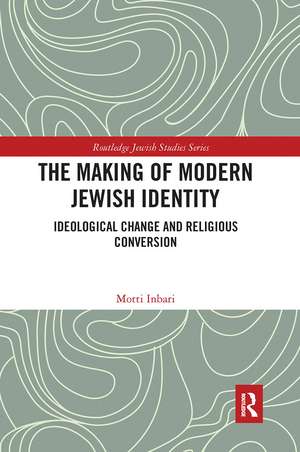The Making of Modern Jewish Identity: Ideological Change and Religious Conversion: Routledge Jewish Studies Series
Autor Motti Inbarien Limba Engleză Paperback – 18 dec 2020
The individuals examined are novelist Arthur Koestler, who transformed from a devout Communist to an anti-Communist crusader following the atrocities of the Stalin regime; Norman Podhoretz, editor of Commentary magazine, who moved from the New Left to neoconservative, disillusioned by US liberal politics; Yissachar Shlomo Teichtel, who transformed from an ultra-Orthodox anti-Zionist Hungarian rabbi to messianic Religious-Zionist due to the events of the Holocaust; Ruth Ben-David, who converted to Judaism after the Second World War in France because of her sympathy with Zionism, eventually becoming a radical anti-Israeli advocate; Haim Herman Cohn, Israeli Supreme Court justice, who grew up as a non-Zionist Orthodox Jew in Germany, later renouncing his belief in God due to the events of the Holocaust; and Avraham (Avrum) Burg, prominent centrist Israeli politician who served as the Speaker of the Knesset and head of the Jewish Agency, who later became a post-Zionist.
Comparing aspects of modern politics to religion, the book will be of interest to researchers in a broad range of areas including modern Jewish studies, sociology of religion, and political science.
| Toate formatele și edițiile | Preț | Express |
|---|---|---|
| Paperback (1) | 270.20 lei 6-8 săpt. | |
| Taylor & Francis – 18 dec 2020 | 270.20 lei 6-8 săpt. | |
| Hardback (1) | 763.39 lei 6-8 săpt. | |
| Taylor & Francis – 31 mai 2019 | 763.39 lei 6-8 săpt. |
Din seria Routledge Jewish Studies Series
-
 Preț: 311.41 lei
Preț: 311.41 lei -
 Preț: 390.13 lei
Preț: 390.13 lei - 28%
 Preț: 821.82 lei
Preț: 821.82 lei - 18%
 Preț: 1059.93 lei
Preț: 1059.93 lei - 28%
 Preț: 819.50 lei
Preț: 819.50 lei - 15%
 Preț: 295.25 lei
Preț: 295.25 lei - 18%
 Preț: 1061.06 lei
Preț: 1061.06 lei -
 Preț: 446.32 lei
Preț: 446.32 lei - 18%
 Preț: 1222.82 lei
Preț: 1222.82 lei - 18%
 Preț: 1110.74 lei
Preț: 1110.74 lei -
 Preț: 493.80 lei
Preț: 493.80 lei - 18%
 Preț: 1068.18 lei
Preț: 1068.18 lei - 18%
 Preț: 1060.87 lei
Preț: 1060.87 lei - 18%
 Preț: 1056.14 lei
Preț: 1056.14 lei - 16%
 Preț: 297.79 lei
Preț: 297.79 lei - 18%
 Preț: 706.57 lei
Preț: 706.57 lei - 18%
 Preț: 1054.58 lei
Preț: 1054.58 lei - 18%
 Preț: 1053.16 lei
Preț: 1053.16 lei - 18%
 Preț: 999.98 lei
Preț: 999.98 lei -
 Preț: 466.45 lei
Preț: 466.45 lei - 18%
 Preț: 1173.97 lei
Preț: 1173.97 lei - 24%
 Preț: 320.80 lei
Preț: 320.80 lei - 18%
 Preț: 1066.09 lei
Preț: 1066.09 lei - 18%
 Preț: 1049.19 lei
Preț: 1049.19 lei - 18%
 Preț: 1057.75 lei
Preț: 1057.75 lei -
 Preț: 487.37 lei
Preț: 487.37 lei - 28%
 Preț: 817.48 lei
Preț: 817.48 lei - 12%
 Preț: 299.87 lei
Preț: 299.87 lei - 18%
 Preț: 1387.62 lei
Preț: 1387.62 lei - 18%
 Preț: 1069.23 lei
Preț: 1069.23 lei - 18%
 Preț: 1111.55 lei
Preț: 1111.55 lei -
 Preț: 448.86 lei
Preț: 448.86 lei - 15%
 Preț: 678.83 lei
Preț: 678.83 lei -
 Preț: 413.94 lei
Preț: 413.94 lei - 25%
 Preț: 325.58 lei
Preț: 325.58 lei - 18%
 Preț: 1114.70 lei
Preț: 1114.70 lei - 31%
 Preț: 766.66 lei
Preț: 766.66 lei - 28%
 Preț: 820.71 lei
Preț: 820.71 lei - 28%
 Preț: 853.61 lei
Preț: 853.61 lei - 18%
 Preț: 1052.35 lei
Preț: 1052.35 lei - 18%
 Preț: 997.11 lei
Preț: 997.11 lei - 18%
 Preț: 1326.06 lei
Preț: 1326.06 lei
Preț: 270.20 lei
Preț vechi: 325.30 lei
-17% Nou
Puncte Express: 405
Preț estimativ în valută:
51.72€ • 56.20$ • 43.47£
51.72€ • 56.20$ • 43.47£
Carte tipărită la comandă
Livrare economică 22 aprilie-06 mai
Preluare comenzi: 021 569.72.76
Specificații
ISBN-13: 9780367728663
ISBN-10: 0367728664
Pagini: 182
Dimensiuni: 156 x 234 mm
Greutate: 0.34 kg
Ediția:1
Editura: Taylor & Francis
Colecția Routledge
Seria Routledge Jewish Studies Series
Locul publicării:Oxford, United Kingdom
ISBN-10: 0367728664
Pagini: 182
Dimensiuni: 156 x 234 mm
Greutate: 0.34 kg
Ediția:1
Editura: Taylor & Francis
Colecția Routledge
Seria Routledge Jewish Studies Series
Locul publicării:Oxford, United Kingdom
Public țintă
Postgraduate and UndergraduateCuprins
Introduction 1. Moving Away From Communism: The Case of Arthur Koestler 2. "Is it good for the Jews?" The Conversion of Norman Podhoretz, Editor of Commentary magazine, from the New Left to Neoconservatism 3. From Anti-Zionist Orthodoxy to Messianic Religious Zionist: the Case of Yissachar Shlomo Teichtel 4. From Spiritual Conversion to Ideological Conversion: The Quest of Ruth Ben-David 5. The "Deconversion" of Haim Herman Cohn: A Model of Secular Religion 6. Avraham (Avrum) Burg between Religious Zionism and Post-Zionism Concluding remarks
Notă biografică
Motti Inbari is an Associate Professor of Religion at the University of North Carolina at Pembroke. An expert in the study of Jewish Orthodoxy, his books include Jewish Fundamentalism and the Temple Mount (2009), Messianic Religious Zionism Confronts Israeli Territorial Compromises (2012), and Jewish Radical Ultra-Orthodoxy Confronts Modernity, Zionism and Women’s Equality (2016).
Recenzii
"The book offers interesting glimpses into the relationship between the psychological, religious, and political biographies of noteworthy Jewish figures. Inbari’s invitation to consider the experience of conversion, be it political or theological, as an important theme within the modern Jewish experience is a welcome one, and one can only hope that scholars will further pursue this line of inquiry that promises to challenge common assumptions." — Eva Gurevich, H-Judaic, H-Net Reviews, January 2020
Descriere
This volume explores the processes that led several modern Jewish leaders – rabbis, politicians, and intellectuals – to make radical changes to their ideology regarding Zionism, Socialism, and Orthodoxy.
